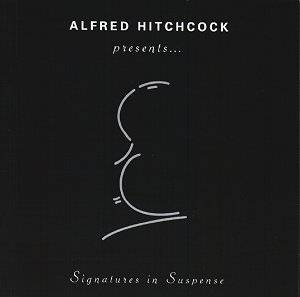
This is a superb production. I cannot think of a more elegant and fitting
tribute to the master of suspense. One is immediately impressed with the
quality feel of this album. The design is an elegant gate-fold sleeve with
the booklet housed neatly under a flap that has a picture of ‘Hitch’
photographed with a row of cans of films of all 49 of his thrillers up to
Marnie. (Inside the booklet there is another witty picture of
‘Hitch’ hitching himself up to place a can of his 50th
film, Torn Curtain on the pile that towers above him.) The booklet
and elaborate sleeve are printed beautifully in black and white with very
tasteful typography and excellent pictures. Another of these shows Hitch
walking down flights of stairs with an assistant dutifully carrying his studio
chair behind him.
But it is, of course, the music that is important and here we have some
fascinating material that has never been released before and, even more
important, the music of the majority of the tracks is conducted by the composers
themselves.
The album opens with the theme that introduced the long-running TV series
Alfred Hitchcock Presents; Gounod’s ‘Funeral March
of a Marionette,’ chosen by Hitch himself. Its mordant strains were
a perfect match for his rotund personality and dry wit.
Dimitri Tiomkin conducts two themes. From Dial M for
Murder, there is the love music for the scenes between Grace Kelly
and Robert Cummins, which, at its centre, grows tawdry for this is the illicit
affair that sparks off Ray Milland’s cunning murder plot. Cleverly,
Tiomkin weaves the telephone’s dialling and ringing into his score.
In contrast, constancy speaks in the love music for I Confess.
It recalls the past love between the priest (Montgomery Clift) and Ruth (Anne
Baxter). The quality of the sound on these two tracks is so-so.
Franz Waxman is represented by the edgy energy of ‘Jukebox
# 6’, from Rear Window; an overt jazz piece
with the composer conducting the Paramount Studio orchestra. This exuberant
little piece has never been available before.
But it is, of course, Bernard Herrmann, whom we principally associate with
Hitchcock. In this collection, we hear Herrmann himself conducting the Paramount
Studio Orchestra in the ‘Scene d’Amour’ from
Vertigo. The composer' reading is definitive: you feel
Scotty’s pent-up sexual desire boiling over and the music fairly bristles
with forebodings of imminent disillusion and tragedy. From North
by Northwest, Herrmann conducts the MGM Studio Orchestra in
the opening Fandango, but as it is used to underscore the scene where Cary
Grant, forcibly intoxicated, careers out-of-control, driving down a country
road. Also included are brilliant refurbishments of the old Decca Phase 4
(London) recordings Herrmann made, with the London orchestras, of
Psycho (A narrative for Orchestra) and his deliciously wickedly
funny ‘A Portrait of Hitch’ (from The Trouble With
Harry). Psycho comes up especially well with all those shrieking
murder-scenes chords very well defined. Previously unreleased is Herrmann’s
Prelude from Marnie with the composer conducting the Universal
Studio Orchestra. This prelude includes some poignant material that
poignantly suggests the vulnerability of the beautiful Marnie.
From Bernard Herrmann’s more popular music-based score appropriate to
The Wrong Man, in which musician Henry Fonda
is wrongly accused of murder, we hear Elmer Bernstein conducting the Royal
Philharmonic Orchestra in the film’s Prelude. But the most interesting
of all the Herrmann tracks must surely be another previously unreleased set
of three excerpts from his rejected music for Torn
Curtain. These are: ‘Prelude’, ‘The Ship’
and ‘The Radiogram’. In Herrmann’s hands his 16 horns and
12 flutes vividly evoke the harsh, steely, unrelentingly repressive Soviet-block
regime. The Prelude is certainly far more arresting than John
Addison’s relatively colourless, jazz-based, commercial score for
which Hitchcock settled. Addison’s ‘Main Title’ for Torn
Curtain is placed, for obvious comparison, immediately before the Herrmann
material in this collection!
Henry Mancini also felt Hitchcock’s ire. He was released from scoring
Frenzy. Stalwart Ron Goodwin (often
underrated) stepped in and wrote a fine score that included the stately
‘London Theme’ that played under Frenzy’s opening titles.
It is played by the City of Prague Philharmonic; so, too, is the Maurice
Jarre’s jarring (forgive the pun) and very untypical Hitchcockian March
from Topaz. These two tracks have been borrowed from Silva
Screen collections.
Finally we have music from John Williams who scored Alfred
Hitchcock’s last film, the black comedy, Family Plot.
The ‘End Titles’ echoes the bizarre elements of this movie including
Barbara Harris’s kooky psychic and the baroque influence of Cathleen
Nesbitt’s millionairess as characterised by the harpsichord.
It seems a pity that, after all that praise, I need to carp but the design
of the booklet makes the sequencing of the (non-numbered and non-timed) tracks
ambiguous. That is to say if you follow the programme through by the sequence
of the track by track analyses. Unless you know the music, you need to check
with the order of programme, printed on the rear of the sleeve to ensure
you know which selection you are hearing. A Silly and irritating oversight;
otherwise an outstanding release.
Reviewer
Ian Lace

|